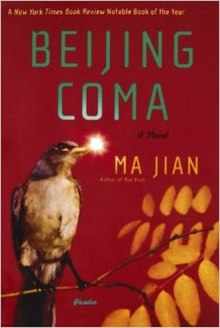Beijing Coma
 | |
| Author | Ma Jian |
|---|---|
| Translator | Flora Drew |
| Language | Chinese |
| Publisher | Farrar, Straus and Giroux |
| Publication place | United States |
Published in English | May 27, 2008 |
| Media type | |
| Pages | 592 ppg |
| ISBN | 0374110174 |
Beijing Coma is a 2008 novel by Ma Jian. It was translated from Chinese by Flora Drew.[1] The Chinese government has since banned the book.[2] Ma has stated that he wrote the book "to reclaim history from a totalitarian government whose role is to erase it" and named the novel Beijing Coma in reference to this.[3][4] Beijing Coma was listed as one of The New York Times "100 Notable Books of 2008".[5]
Synopsis
[edit]The book follows the character of Dai Wei, a man who awakens from a coma to discover that ten years have passed since he was shot in Tiananmen Square on June 4, 1989. The book's narrative switches between Dai Wei's time as a non-responsive coma patient to his life before his shooting.
Reception
[edit]Critical reception for the book was positive,[6][7][8] with Tash Aw calling it "a landmark".[9] In Bookmarks Sep/Oct 2008 issue, a magazine that aggregates critic reviews of books, the book received a ![]()
![]()
![]()
![]()
![]() (4.00 out of 5) with the summary stating, "Even reviewers who found serious problems with Beijing Coma admired its political honesty and narrative premise".[10]
(4.00 out of 5) with the summary stating, "Even reviewers who found serious problems with Beijing Coma admired its political honesty and narrative premise".[10]
Pankaj Mishra compared Beijing Coma with the work of writers such as Milan Kundera, Josef Škvorecký and Ivan Klíma.[1] Michiko Kakutani praised the novel's translation while stating that the book "is desperately in need of editing".[11]
Controversy
[edit]In April 2012 Ma protested the choice of China as the guest of honor at the London Book Fair.[12] Ma used red paint to smear a cross over his face and attempted to present a copy of Beijing Coma to Liu Binjie, but was stopped by security. Ma called his Chinese publisher a "mouthpiece of the Chinese communist party" and claimed that he had been manhandled while trying to give Liu his book.[13]
References
[edit]- ^ a b Mishra, Pankaj (June 30, 2008). "Tiananmen's Wake: A novel of hope and cynicism". The New Yorker. Condé Nast Publications. Retrieved June 30, 2008.
- ^ Smallwood, Christine (May 25, 2008). "Cage of bones". Los Angeles Times. Retrieved September 1, 2012.
- ^ Stone, Beth. "Beijing Coma". Socialist Review. Archived from the original on October 14, 2011. Retrieved September 1, 2012.
- ^ "Tiananmen remembered". BBC News. June 4, 2009. Retrieved September 1, 2012.
- ^ "100 notable books of 2008". The New York Times. December 4, 2008. Retrieved September 1, 2012.
- ^ Lasdun, James (May 2, 2008). "Children of the revolution". The Guardian. Retrieved September 1, 2012.
- ^ Row, Jess (July 13, 2008). "Circling the Square". The New York Times. Retrieved September 1, 2012.
- ^ Cheuse, Alan (June 29, 2008). "'Beijing Coma' fuses China's past, present". SF Gate. Retrieved September 1, 2012.
- ^ Aw, Tash (April 26, 2008). "A story of Tiananmen Square". Telegraph. Retrieved September 1, 2012.
- ^ "Beijing Coma By Ma Jian". Bookmarks Magazine. Archived from the original on September 6, 2015. Retrieved January 14, 2023.
- ^ Kakutani, Michiko (July 4, 2008). "A Broken Body in Shiny, New China". The New York Times. Retrieved September 1, 2012.
- ^ Lane, Victoria (April 17, 2012). "A Letter from China". Telegraph. Retrieved September 1, 2012.
- ^ Page, Benedicte (April 19, 2012). "Ma Jian protest paints the London Book Fair red". The Guardian. Retrieved April 19, 2012.
